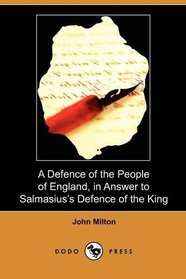Search -
A Defence of the People of England, in Answer to Salmasius's Defence of the King (Dodo Press)
A Defence of the People of England in Answer to Salmasius's Defence of the King - Dodo Press
Author:
John Milton (1608-1674) was an English poet, prose polemicist and civil servant for the Commonwealth of England. Most famed for his epic poem Paradise Lost, Milton is celebrated as well for his treatise condemning censorship, Areopagitica. John Milton matriculated at Christ's College, Cambridge, in 1625 and, in preparation for becoming an Anglic... more »
Author:
John Milton (1608-1674) was an English poet, prose polemicist and civil servant for the Commonwealth of England. Most famed for his epic poem Paradise Lost, Milton is celebrated as well for his treatise condemning censorship, Areopagitica. John Milton matriculated at Christ's College, Cambridge, in 1625 and, in preparation for becoming an Anglic... more »
ISBN-13: 9781409982302
ISBN-10: 1409982300
Publication Date: 5/29/2009
Pages: 182
Rating: ?
ISBN-10: 1409982300
Publication Date: 5/29/2009
Pages: 182
Rating: ?
0 stars, based on 0 rating




